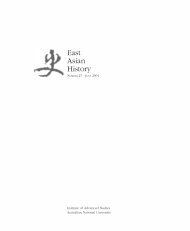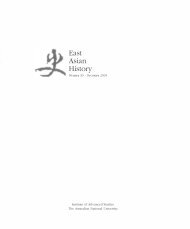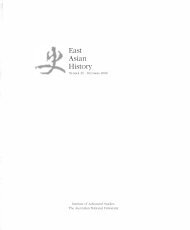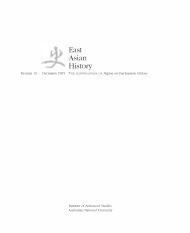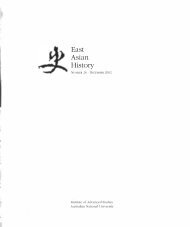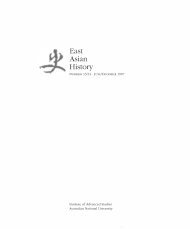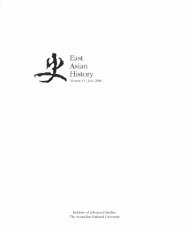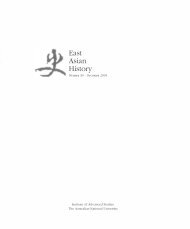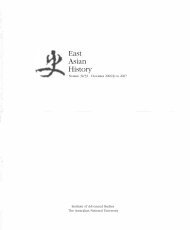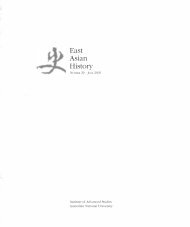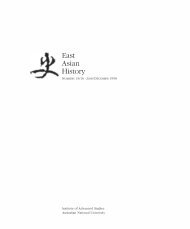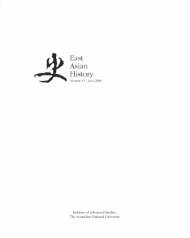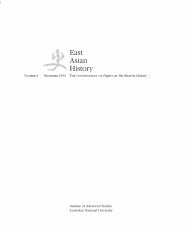Observations from a Film - (Miriam Lang) (PDF ... - East Asian History
Observations from a Film - (Miriam Lang) (PDF ... - East Asian History
Observations from a Film - (Miriam Lang) (PDF ... - East Asian History
- No tags were found...
Create successful ePaper yourself
Turn your PDF publications into a flip-book with our unique Google optimized e-Paper software.
TRADITIONAL MUSICIANS IN CONTEMPORARY CHINA161Guanzai's planned use of the money is an attempt to leave China for HongKong with a friend. Ou Laoshu sells another relic of his former decadent life,his opium pipe, to make his son a special farewell meal before he leaves. Ashe makes his culinary specialty ' taiye chicken' ::t X!l he cannot keep <strong>from</strong>his usual pretentious name-dropping: "This was Ma Shizeng's favoritefood. ,,48 He writes to a friend in Hong Kong to entrust the care of his son tohim. On the appointed morning of Guanzai's departure, however, Guanzai'sfriend leaves without him, taking all of their shared funds, and Guanzai isforced to return home.Soon afterward, Ou Laoshu is told by officials of the ProvincialRevolutionary Committee that one of his old friends, now a companymanager in Hong Kong, has come to Guangzhou for a trade fair and wouldlike to make contact with him. The officials approve of this idea and directhim to go, in order to demonstrate the success of the Cultural Revolution inallOWing an old decadent musician to be rehabilitated and 'becomeindependent'. Ou Laoshu takes all of his old scores (which, along with theqinzbeng and the opium pipe, have survived the Cultural Revolution) andgoes to meet his friend at a restaurant, accompanied by a sizeable group ofsupervisory officials.In his friend's hotel room after the meal he shows him his scores and asksfor his opinion. The Hong Kong friend is approving, and offers to help OuLaoshu to get the music recorded in Hong Kong. At first Ou declines, sayingthat he hopes to have it published and performed in China, but his friend isable to persuade him with the words, "But why are you so foolish? Look atthe situation. Such good music, what a shame. Leave them for me to readproperly. I'll return them." Ou Laoshu is full of gratitude.His happiness is short-lived, however. Listening to a Hong Kong stationon the short-wave radio given to him by his Hong Kong friend, he hears theannouncer introduce "some recently discovered pieces by He Dasha whichhave become extremely popular." He listens aghast as his own composition,Nigbt Moon ofPingsba ljZtplllA, is played and attributed to He Dasha. Asthe stolen music plays, Guanzai says to his father, "Let them be He Dasha'satleast they're heard." "Damn the bastard," cries Ou Laoshu, and smashesthe crockery off the table.Obviously the treacherous 'friend' was more eager to make money forhimself than to help Ou Laoshu. In passing the compositions off as HeDasha's, he greatly increased their chance of publication and with it thefinancial returns that coli"ld be expected <strong>from</strong> them. The fact that the musicwould not be profitable without a famous name attached demonstrates thedominance of the pre-1949 composers over the musical world, even decadesafter their deaths.In portraying the Hong Kong Chinese music world as no less inhospitableto the composer than the People's Republic, Swan Song underlines thehopelessness of Ou Laoshu's longing for recognition. Even though there is48 Ma Shizeng tt 0900-64) was a wellknownand innovative perfonner of Cantoneseopera (Zhongguo yinyue cidian, p.258).



